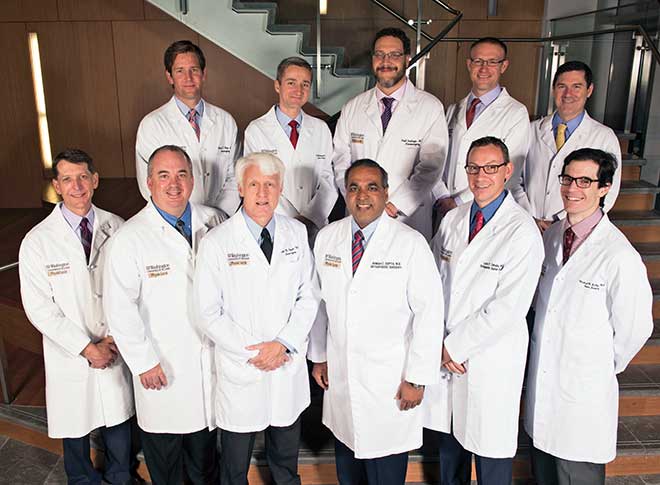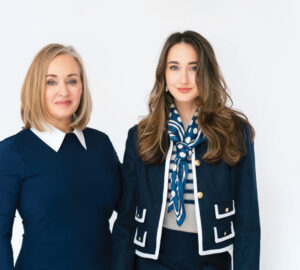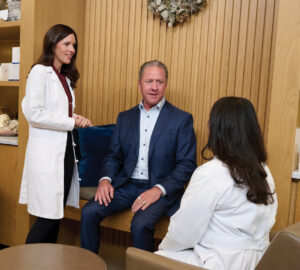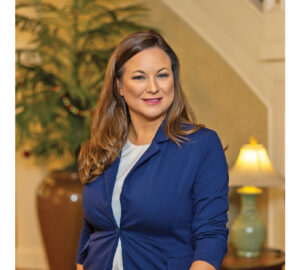The decision to have back surgery isn’t easy. For children and adults suffering from chronic back pain or a debilitating spinal deformity, however, the procedure may be the best way to increase mobility and improve quality of life. The 11 spine specialists, including neurosurgeons and orthopedic surgeons, at Washington University provide minimally invasive to complex surgeries for a range of spinal conditions and diseases in children and adults. “I love seeing how my patients feel before surgery and then how much better they feel afterward,” says Dr. Munish Gupta, the new chief of spine surgery in the Department of Orthopedic Surgery. “We are improving lives, one at a time.”
A spinal surgeon for 23 years, Gupta recently joined Washington University to help patients with severe spinal deformities. Whether it’s children or adults, the most common ailment he treats is scoliosis. Correcting a curvature of the spine, especially one greater than 50 degrees, is a demanding operation, he says, that typically takes four to eight hours. “We do everything possible to avoid surgery, but you have to weigh the risks and benefits” he says. “Scoliosis can be a serious condition, especially when really young people have it. This can be a life-saving procedure.”
 Open-back surgery sounds scary, but the overwhelming majority of those who undergo the procedure have no complications during or after, Gupta says. Advances in equipment and techniques have made spinal surgery safer than ever, he adds. There are risks, however, including infection and nerve damage. “The more frequently an institution performs a surgery, the better the outcomes,” Gupta says. “Washington University has the strength of numbers.”
Open-back surgery sounds scary, but the overwhelming majority of those who undergo the procedure have no complications during or after, Gupta says. Advances in equipment and techniques have made spinal surgery safer than ever, he adds. There are risks, however, including infection and nerve damage. “The more frequently an institution performs a surgery, the better the outcomes,” Gupta says. “Washington University has the strength of numbers.”
In addition to handling some of the most difficult cases, Gupta is working in collaboration with the department of neurosurgery to create a comprehensive spine service. It would house the large cadre of spinal surgeons, plus pain management and physical medicine and rehabilitation services all under one roof. He created a similar service at the University of California, Davis prior to moving to St. Louis last month. “This will be a one-stop service for all spine ailments, making it more efficient to help our patients,” Gupta says. “No matter what your problem is, from a simple disc herniation to a tumor of the spine, we will be able to take care of it in one place.”
A dedicated building for spine services is a few years away, but the spirit of collaboration is already in practice, says neurosurgeon Dr. Neill Wright, co-director of the developing spine unit. “For the last several years, we’ve been streamlining the practice of spine surgery. We’ve removed many of the barriers of getting from one doctor to the next to make it easier for patients who may have driven hours to get here.” For example, orthopedic surgeons and neurosurgeons may work together on a case that involves both spinal deformity and a tumor. “Everyone has the same goal, which is delivering world-class care that’s convenient for the patient,” Wright says. “The culmination of that will be having all of us in the same building.”
Pictured: Washington University spine specialists, from front left: Drs. Scott Luhmann, Neill Wright, Keith Bridwell, Munish Gupta, Lukas Zebala, Michael Kelly. Back: Drs. Wilson Ray, Jacob Buchowski, Paul Santiago, Ian Dorward, Dave Limbrick
Photo: Tim Parker Photography
[Washington University Orthopedics Spine Service treats adult and pediatric patients with a wide range of spinal diseases. Pictured on the cover, in back: Drs. Jacob Buchowski and Ian Dorward. In front: Drs. Neill Wright, Munish Gupta, Keith Bridwell and Paul Santiago. For more information, visit barnesjewish.org/spine or call 800.867.3627.]








